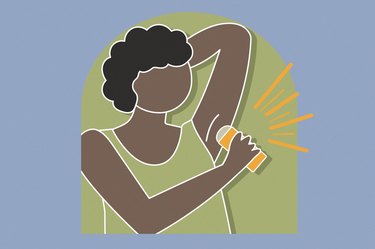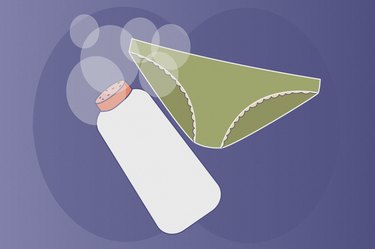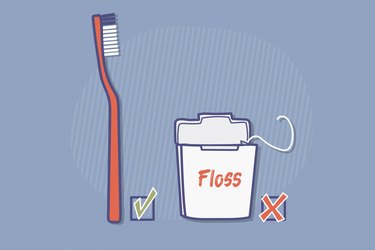
Antiperspirant has been getting a bad rap lately, with the active ingredient aluminum being blamed for seemingly everything from breast cancer to dementia. So it's no wonder you see products advertised as "all natural" or "aluminum-free" all over the supermarket shelves and shopping sites.
It might even be driving the declining use of underarm hygiene products. In a June 2019 YouGov poll, nearly 40 percent of 18- to 24-year-olds and 31 percent of 25- to 34-year-olds said they hadn't worn antiperspirant or deodorant in the last month.
Video of the Day
Video of the Day
But is aluminum actually worth sweating over? And what about benzene? We talked to dermatologists about whether or not you should toss your stay-dry stick.
First, Why Do We Sweat?
There's a reason why "hot and sweaty" are synonymous. Whether you're tearing it up on your Peloton or relaxing at the beach on a hot summer day, your skin starts to glisten in order to bring you relief from the heat.
"Sweating's main goal is to cool you down and regulate your body temperature," says Corey L. Hartman, MD, founder and medical director of Skin Wellness Dermatology in Birmingham, Alabama, and Assistant Clinical Professor of Dermatology at the University of Alabama School of Medicine.
You have sweat glands called eccrine glands located all over your body that churn out liquid in response to high temps.
"Sweat glands live under your skin and are connected to the outer surface by a little tube called the sweat duct," says spokesperson for the Skin of Color Society Seemal Desai, MD, president and medical director of Innovative Dermatology in Plano, Texas, and Clinical Assistant Professor of Dermatology at the University of Texas Southwestern Medical Center.
As the moisture evaporates off your skin, it cools you down. According to the Cleveland Clinic, perspiration is made up of 99 percent water; the remaining 1 percent is a mixture of urea, uric acid, lactic acid and vitamin C, among other substances.
But feeling steamy isn't the only trigger. We also start to drip when we're nervous. Stress-induced sweat is released by apocrine glands, located on your scalp, in your groin and, yep, under your arms.
Apocrine sweat is thicker and oilier than eccrine sweat. And while apocrine sweat itself is odorless, the natural bacteria on your skin create a pungent scent as they break it down — hello, B.O.!
The Difference Between Antiperspirant and Deodorant
Although the terms antiperspirant and deodorant are often used interchangeably, they are actually two totally different products.
"Antiperspirant clogs the sweat ducts with an ingredient called aluminum chlorohydrate to prevent the secretion of sweat," Dr. Desai says. "By decreasing the amount of sweat, it also leads to a reduction in odor."
Deodorant, on the other hand, isn't designed to prevent damp underarms, but rather to put the brakes on rank smells by inhibiting odor-causing bacteria.
"Deodorant is typically alcohol-based, which turns the skin's pH more acidic, making it less attractive to bacteria," Dr. Desai says.
Deodorants with a baking soda base do the same thing but on the opposite side of the pH scale. Baking soda is alkaline and it raises the pH of the skin to help decrease bacteria.
Both antiperspirant and deodorant are typically infused with fragrance to mask unpleasant aromas.
Is the Aluminum in Antiperspirant Bad for You?
The short answer: Probably not. Research to date suggests it's not toxic, but we don't know for sure. "It is controversial and there is not enough data to say," Dr. Desai says.
We get that that's not exactly a satisfying answer. So let's break down what we do know about the two primary health concerns that aluminum has been pegged to: breast cancer and Alzheimer's disease.
Aluminum and Breast Cancer
Suspicions around aluminum and breast cancer first arose in the 1980s, stemming from the fact that tumors are often found in the area of the breast near the armpit. Moreover, some biopsies revealed that malignant breast tissue contained aluminum deposits.
"But research has shown that breast cancer tissue doesn't appear to have more aluminum than normal tissue," Dr. Desai says.
As for tumors near the underarm, the tissue is denser in this area and the number of breast cancers is proportionate to the amount of tissue, according to the American Cancer Society (ACS).
Another fear is that harmful chemicals in antiperspirant could be absorbed into the lymph nodes through nicks in the underarm caused by shaving. The idea is that because your body can't sweat out these substances with aluminum plugging your ducts, it leads to a buildup of cancer-causing toxins.
Here's a comforting reality check: Your body filters out toxins through the kidneys and liver, not sweat glands.
Finally, some people worry whether aluminum could affect the estrogen receptors of breast cells, promoting the growth of cancer. But it turns out there's no need to stress about this, either.
"If you use antiperspirant, only a very, very small amount of aluminum is absorbed," Dr. Desai says.
Per the ACS, a miniscule 0.012 percent of aluminum enters your body — much less than you get from the food you eat on a daily basis.
The bottom line: A slew of recent studies have failed to prove a link between breast cancer and what you swipe across your pits. As a September 2017 review in Deutsches Artzeblatt International states, "There are currently no consistent data from epidemiological studies relating to an association between aluminum exposure and breast cancer risk; the majority of studies available to date found no association in this regard."
Aluminum and Alzheimer’s
The theory that aluminum exposure could lead to Alzheimer's was first voiced in the 1960s, when studies showed elevated levels of aluminum in patients' brains.
"Although there are plaques formed in the brains of Alzheimer's patients derived from aluminum, there is no link to show that applying aluminum under your arms affects your brain," Dr. Hartman says.
The Deutsches Artzeblatt International review concluded that "epidemiological studies provide only very uncertain indications of an association between aluminum exposure and Alzheimer's disease."
Even if aluminum does play a role, the amount that enters your body via antiperspirant is so negligible that it is highly unlikely to cause any damage.
"Remember that aluminum salts are not being absorbed into your bloodstream," Dr. Hartman says. "They just sit in your sweat glands until they naturally break down and disintegrate or are washed off."
What About Benzene?
The carcinogen benzene, which has been linked to blood cancers like leukemia, has been found in several spray deodorants and antiperspirants, according to the independent testing lab Valisure. Benzene was detected in 44 products from brands including Secret, Tag, Old Spice, Equate, Sure, Suave, Summer's Eve, Brut, Right Guard, Soft & Dri, Powder Stick and Victoria's Secret. You can find the full list of these products in a petition Valisure filed with the Food & Drug Administration.
The FDA has said that no levels of benzene are safe for humans, so it's best to avoid these products.
Keep in mind that this doesn't extend to all antiperspirants from these brands, though — benzene was only detected in some aerosol products, so if you don't use a spray, you're in the clear here.
3 Side Effects of Antiperspirant and Deodorant That Stink

Antiperspirant is probably not to blame for any serious health problems, but you might encounter one of these pesky issues.
1. A Yucky Rash
Ever break out in bumps after gliding on antiperspirant or deodorant? "Many people experience a raw, red, itchy irritation called contact dermatitis," Dr. Hartman says.
While contact dermatitis can be triggered by aluminum, fragrances and alcohol-based products are the usual culprits.
"Some people also have allergic reactions to parabens, triclosan and propylene glycol," Dr. Hartman says. Steer clear of these ingredients if you've noticed you're sensitive to them.
Also, avoid applying a harsh product directly post-shave, which can cause burning and stinging.
"Use a cooling gel or gentle moisturizer after shaving and then wait 10 minutes to an hour before putting on deodorant or antiperspirant," Dr. Desai says. "Because the skin is extremely thin and sensitive under the arm, don't rub it on vigorously."
In addition, he suggests folks with flare-ups consider a "free and clear" product, like Vanicream, which is formulated for sensitive skin and contains lower alcohol and no parabens. "Use it every other day," Dr. Desai says.
If it's still bothering you? "Try an over-the-counter cortisone cream," Dr. Hartman says. (Cortisone-10 is a popular choice.) "Or ask your physician — I often prescribe a topical anti-inflammatory product [to patients with contact dermatitis]." Another option is to get an allergy patch test to pinpoint the specific ingredient that is bothering you.
2. Pit Stains
News flash: Sweat isn't to blame for those unsightly yellow splotches on your clothes. "It's actually antiperspirant that leaves residue on textiles," Dr. Hartman says.
More specifically, a 2017 paper in IOP Conference Series: Materials Science and Engineering reported that when aluminum combines with perspiration, it creates a chemical reaction that discolors fabric. Switch to an aluminum-free product, and you'll likely save a fortune in dry cleaning.
3. Excess Sweating
"Although it's not common, it is possible to build up a tolerance to antiperspirant," Dr. Hartman says.
And that's the pits.
"Sweating may seem like a small thing, but if it's constant and affecting your ability to do your work and have interpersonal relationships, then it's time to seek professional help," Dr. Hartman says.
So talk to a derm about a solution if you're sweating buckets. These days, there are all kinds of stay-dry strategies you can try.
"There is a topical glycopyrrolate — a towelette that stops the effect of the plexus of nerves that controls the sweat glands," Dr. Hartman says. "Botox injections can also temporarily stop these nerves from firing and producing more sweat." These treatments typically are effective for three to four months.
So, How Bad Is It Really to Use Antiperspirant?
As long as you're not using a spray antiperspirant that's been found to contain benzene, don't sweat it.
"To date, there are no studies that show a causal link between using antiperspirant and either breast cancer or Alzheimer's," Dr. Hartman says. "As a doctor, I'm evidence-based, and I am always going to go to the science. So I would say it's fine."
Dr. Hartman only uses deodorant himself, and Dr. Desai says that if wetness isn't bothering you per se, it's best to opt for deodorant. But both docs still recommend antiperspirant for people who sweat more than they'd like.
- YouGov: "Justin Bieber Is Selling Vegan Deodorant. Will Gen Z and Millennial Shopper Buy It?
- Cleveland Clinic: "Breaking a Sweat: Why You Sweat and What It Says About Your Health"
- Deutsches Artzeblatt International: "The Health Effects of Aluminum Exposure"
- American Cancer Society: "Antiperspirants and Breast Cancer Risk"
- IOP Conference Series: Materials Science and Engineering: "A novel washing algorithm for underarm stain removal"
- Valisure: "FDA Citizen Petition on Body Spray"
- FDA: "Appendix 4: Toxicological Data for Class 1 Solvents"
Is this an emergency? If you are experiencing serious medical symptoms, please see the National Library of Medicine’s list of signs you need emergency medical attention or call 911.



